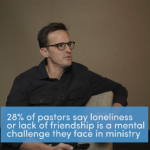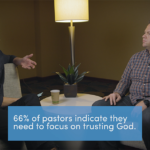
The goal should not be to teach people how best to live in this present moment, but rather to cultivate people fit to live in eternity.
By Aaron Earls
Churches and pastors are seemingly bombarded with urgency. Headlines and emails proclaim the current issue to be the biggest, greatest, worst, most important ever.
In some sense, that is understandable. Many issues facing churches today, particularly the pandemic, have reshaped church life for at least the foreseeable future. The current political environment and technological shifts alter the discipleship trajectory of churchgoers. Local problems that are specific to your congregation and community may bring lasting challenges.
Yet most of us realize that we and, by extension, our churches can be tempted to cater almost entirely to the priorities of the now. The ultimate goal should not be to teach people how best to live in this present moment, but rather to cultivate people fit to live in eternity. As we grow more like Christ, we are being shaped into a people fit for the new heaven and the new earth. Ironically, this eternal perspective will make us more fit for ministry in our current context.
The ultimate goal should not be to teach people how best to live in this present moment, but rather to cultivate people fit to live in eternity. — @WardrobeDoor Click To TweetTo help us better understand this, we can learn from one who continues to have an impact on the church today despite being dead for almost six decades. C.S. Lewis often spoke about the benefit of reading dead authors as they gave us a better perspective on our own time because they weren’t trapped in this moment with us. Now, he has joined those with a voice not from our time but for our time.
In The Four Loves, C.S. Lewis wrote, “All that is not eternal is eternally out of date.” How can we see that truth work itself out practically in our congregations? Here are four principles drawn from more of Lewis’ work to help us develop eternally up-to-date ministries and churches.
Tie initiatives to biblical priorities
The easiest thing for a church to be is busy, but is the work being done eternally significant? One simple way to answer that question is to determine the motivation behind the task. Why is your church doing something?
If the program or event is directly connected to a priority of Scripture, that’s a great first step. Before you start something, ask how it is related to the Great Commission. Is it a biblical priority or a personal one? Will this help your congregation love God and love others more or will it simply bring more attention to your church and increase your publicity?
The easiest thing for a church to be is busy, but for the work being done to be eternally significant, it should be connected to the priorities God has revealed in Scripture. — @WardrobeDoor Click To TweetIn The Silver Chair, one of the novels in Lewis’ The Chronicles of Narnia, Aslan the lion-king of that world, sends a girl named Jill on a mission and gives her four signs as guideposts for the journey. Unfortunately, she loses focus on the words of Aslan and begins to dwell on her own desires, leading to deadly danger. Realizing her mistake, Jill confesses to her companions, “It’s my fault. I — I’d given up repeating [them] every night.” Don’t make the same mistake as Jill and turn your attention away from the words that must guide our lives and our churches.
Know your people more than pundits
Pastors and church leaders can become enamored with the temporal by spending too much time with TV talking heads whose jobs depend on garnering attention. Be it sports hosts or political commentators, they will do everything in their power to convince you that whatever is happening at this exact moment is the only thing worthy of your attention. The easiest way to avoid falling into this trap is to simply not give them your attention.
Perhaps counter-intuitively, being involved in the day-to-day moments of your congregation can keep you from being consumed with the fleeting concerns of this momentary day. — @WardrobeDoor Click To TweetSome events are important, but the most important events for a church leader will probably be the events happening in the lives of your people. Perhaps counter-intuitively, being involved in the day-to-day moments of your congregation can keep you from being consumed with the fleeting concerns of this momentary day. The reason is the person in your pew will live far beyond the sports franchises or national governments that dominate the news.
In The Weight of Glory, C.S. Lewis’ sermon that was republished as an essay, he reminds us: “You have never talked to a mere mortal. Nations, cultures, arts, civilizations—these are mortal and their life is to ours as the life of a gnat.”
Don’t let current events dictate your sermons
Scripture has something to say for every moment in which we find ourselves. Pastors should make that clear during their time in the pulpit. They should not, however, allow every moment to govern the topic of the sermon.
Leaders should be sensitive in helping churchgoers think biblically about societal happenings, but that can take place without ripping up every planned sermon series after another news event takes place on Saturday. In fact, pastors may be helping their members think biblically by not allowing every “breaking news” headline to determine the entire focus of Sunday mornings.
Pastors may be helping their members think biblically by not allowing every “breaking news” headline to determine the entire focus of Sunday mornings. — @WardrobeDoor Click To TweetIn The Screwtape Letters, Lewis’ fictional account of correspondence between two demons, Screwtape advises his younger apprentice about how to choose the right church from hell’s perspective. The literary demons want churches with watered-down or shock-based Christianity, both focused more on the opinions of popular culture than the truth of Scripture. Of one pastor whose sermons are no longer focused on the Bible, Screwtape writes, “We are thus safe from the danger that any truth not already familiar to him and to his flock should ever reach them through Scripture.”
Aim for timelessness not relevancy
Some churches are better designed for ministry in the 1950s than the 2020s. That is unfortunately true. The best focus of a church, however, is one that is not directed toward being contemporary or traditional but instead eternal.
Churches tying their sermons to a cultural trend may feel very “in the moment,” but that is part of the problem. Inextricably linking God’s eternal Word with something few will remember in five years sends the wrong message about Scripture and quickly turns what could be a timely message into a dated sermon.
Those who worship the King who was, who is, and who is to come should not be driven by momentary issues that didn't matter yesterday, barely matter today, and won't matter tomorrow. — @WardrobeDoor Click To TweetYou cannot manufacture timelessness, but you can avoid chasing relevancy. Spending the bulk of your teaching time on eternal truths rather than popular references will go a long way to helping your ministry echo beyond this moment. Those who worship the King who was, who is, and who is to come should not be driven by momentary issues that didn’t matter yesterday, barely matter today, and won’t matter tomorrow.
In Mere Christianity, Lewis wrote that the Christians who did most for the present world, from the apostles to the English evangelicals who abolished the slave trade, were those who thought most of the next world. Their motivation for change came not from a preoccupation with this life but rather an obsession with the next. “It is since Christians have largely ceased to think of the other world that they have become so ineffective in this,” he wrote. “Aim at heaven and you will get earth ‘thrown in;’ aim at earth and you’ll get neither.”
Often when churches aim for earth, their desires are worthwhile. They want to meet the needs of their congregation and community. A church ignoring the world around them will have little to no impact for God’s Kingdom. But to have the greatest impact on our neighborhood we must be motivated by that eternal Kingdom. We will remain, as Lewis said, eternally out of date, unless the focus of our ministry is eternal.













